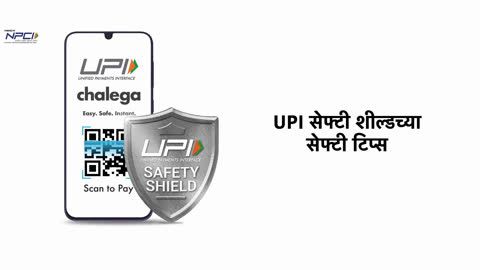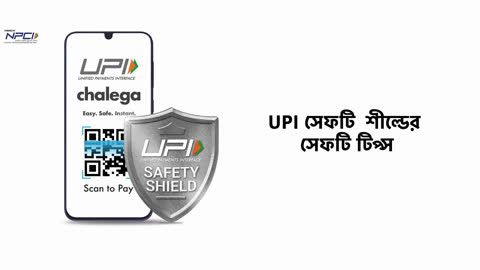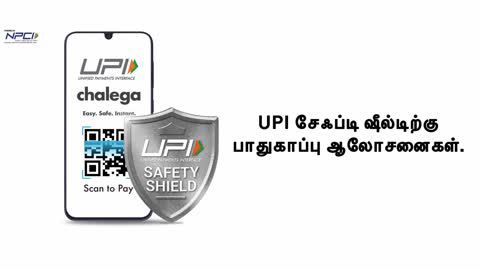Bajaj Pay UPI
UPI, or Unified Payments Interface, is a payment system developed by the National Payments Corporation of India (NPCI) that lets users transfer money between bank accounts using a smartphone. UPI allows instant, secure, and convenient payments, and does not require users to enter their bank account information or other sensitive information when making a payment. Instead, users can simply enter a unique ID, or "virtual payment address," to complete the transaction. To authenticate UPI transactions, users must use a UPI PIN – a four or six-digit code, which the user can set up through their UPI-enabled app.
If you want to track the status of a UPI transaction, you can do so using the UPI reference number. A UPI reference number, also known as a transaction ID, is a unique identification number assigned to each UPI transaction. The reference number is generated by the UPI system and is used to track the transaction's status. UPI payment has become a popular payment method in India and is supported by many banks and financial institutions.
Bajaj Pay is a digital payments platform that allows users to make secure and convenient payments using their smartphones and is powered by UPI. Bajaj Pay supports a range of payment methods, including bank transfers, mobile wallet payments, and credit and debit card payments. The app also allows users to securely store money and make payments for various services, including utility bills, mobile phone bills, and online purchases. Bajaj Pay also offers a range of financial services, such as personal loans and insurance products. It is available as a mobile app for Android and iOS devices.
Once you create your Bajaj Pay UPI ID and perform a transaction, you will receive a welcome offer of up to Rs. 200 as instant cashback. Additionally, you can scan any QR code and make payments to merchants countrywide. With the Bajaj Pay UPI ID, you can pay for big-ticket or inexpensive purchases in a matter of seconds, transfer money to your loved ones or pay your bills quickly and securely.
Features and benefits
-
Safe and secure payments
Pay safely for your daily needs and expenses using Bajaj Pay UPI, guarded with NPCI guidelines
-
Exciting offers for cashback and discounts
Enjoy bill payment offers, merchant payments and send money every month with Bajaj Pay UPI
-
Welcome offer on creating Bajaj Pay UPI ID
Get up to Rs. 200 instant cashback on creating your first Bajaj Pay UPI ID and doing a transaction. T&C apply
-
Make instant payment with QR scan
Scan any QR and make payment to merchants countrywide
How to use UPI safely
 01:56
01:56
Frequently Asked Questions on Bajaj Pay UPI Payment
Unified Payments Interface (UPI) is an instant payment system developed by the National Payments Corporation of India (NPCI), an RBI regulated entity. UPI is built over the IMPS infrastructure and allows you to instantly transfer money between any two parties' bank accounts.
The features and benefits of UPI are:
- Safe and secure payments
- Instant money transfer facilitated 24x7 via your mobile handsets
- Extensive access - Transfer money from all banks that support UPI
- Virtual ID (providing incremental security)
- No addition of beneficiary required
- Transactions can be done using the beneficiary's UPI ID only (no other bank details required)
- Single-click authentication
- Self-help servicing module that makes resolving issues easier
Your UPI-PIN (UPI Personal Identification Number) is a 4-6 digit pass code you create/ set during your first time registration with UPI. You must enter this UPI-PIN to authorize all banking transactions.
IMPS requires you to enter the payee's account number, name and IFSC code while UPI just requires a pre-assigned virtual ID or Virtual Payment Address (VPA) to process the payment.
Virtual Payment Address (VPA) is similar to an email-ID. VPA is created for all users using the Unified Payment Interface (UPI) service to send or receive money. VPA acts as a proxy for the combination of bank account number and IFSC code and adds an additional layer of security when transacting.
UPI is built over the IMPS infrastructure and allows you to instantly transfer money between bank accounts. Developed by the National Payments Corporation of India (NPCI), it allows users to create Virtual Payments Addresses for Banks linked to the UPI network and allow instant payments 24x7 via your mobile handsets.
The Bajaj Finserv app should be your go-to app for all UPI payments. The key benefits of using our app are:
- 24x7 instant money transfers powered by the Bajaj Finserv app from the trusted Bajaj Finserv Group
- Simplified interface to pay bills, recharge your phone and much more
- Our widespread network enables payments across millions of UPI-enabled merchants and billers
- A personalized payment experience
- Complete confidentiality of all your financial data
- Also get exciting offers and vouchers from our partners
Per NPCI guidelines, there is no charge on transactions. The same may change after a certain threshold is reached. This will depend on your bank.
- Offline: Simply scan the QR code at offline stores or enter the Virtual Payment Address of the merchant and complete the transaction by entering your UPI-PIN.
- Online: When shopping online, you can pay through UPI if UPI is one of the available payment options. On clicking that, you will need to enter your Virtual Payment Address (VPA). Once entered, you will receive a collect request on your Bajaj Finserv app. Enter your UPI-PIN and your payment will be completed.
Bajaj Pay UPI works with all banks that support BHIM UPI. PSP partner of the Bajaj Finserv app is Axis Bank.
Roles & Responsibilities of NPCI
- NPCI owns and operates the Unified Payments Interface (UPI).
- NPCI prescribes rules, regulations, guidelines, and the respective roles, responsibilities and liabilities of the PSPs and TPAP, with respect to UPI. This also includes transaction processing and settlement, dispute management and clearing cut-offs for settlement.
- NPCI approves the participation of Customer Banks, PSP, Third Party Application Providers (TPAP) and Prepaid Payment Instrument issuers (PPIs) in UPI.
- NPCI provides a safe, secure and efficient UPI system and network.
- NPCI provides online transaction routing, processing and settlement services to members participating in UPI.
- NPCI can, either directly or through a third party, conduct audit on UPI participants and call for data, information and records related to their participation in UPI.
- NPCI provides the PSP access to the system where they can download reports, raise chargebacks, update the status of UPI payment transactions, etc.
Roles & responsibilities of PSP
- PSP is banking company that is a member of UPI and connects to the UPI platform for providing UPI payment facility to the PSP and TPAP which in turn enables the Users and merchants to complete payment transactions over UPI.
- PSPs, either through its own app or TPAP's app, on-boards and registers the user on UPI and links their bank accounts to their respective UPI ID.
- PSP is responsible for authentication of the User at the time of registration of such customer, either through its own app or TPAP’s app.
- PSP engages and on-boards the TPAPs to make the TPAP's UPI app available to the user.
- PSP has to ensure that TPAP and its systems are adequately secured to function on UPI.
- PSP is responsible to ensure that UPI compliant application and systems of TPAP are audited to safeguard the security and integrity of the data and information of the user, including UPI transaction data as well as UPI app security.
- PSP has to store all the payments data, including UPI transaction data collected for the purpose of facilitating UPI transactions, only in India.
- PSP is responsible to give all UPI customers an option to choose any bank account from the list of Customer’s Banks available on UPI platform for linking with the customer’s UPI ID.
- PSP is responsible to put in place a grievance redressal mechanism for resolving complaints and disputes raised by the user.
Roles and responsibilities of TPAP:
- TPAP is a service provider to the PSP and participates in UPI through PSP.
- TPAP is responsible to comply with all the requirements prescribed by PSP and NPCI in relation to TPAP’s participation in UPI.
- TPAP is responsible to ensure that its systems are adequately secured to function on the UPI platform.
- TPAP is responsible to comply with all the applicable laws, rules, regulations and guidelines etc. prescribed by any statutory or regulatory authority in relation to UPI and TPAP’s participation on the UPI platform including all circulars and guidelines issued by NPCI in this regard.
- TPAP has to store all the payments data, including UPI transaction data collected by TPAP for the purpose of facilitating UPI transactions, only in India.
- TPAP is responsible to facilitate RBI, NPCI and other agencies nominated by RBI/ NPCI, to access the data, information, systems of TPAP and carry out audits of TPAP, as and when required by RBI and NPCI.
- TPAP shall facilitate the User with an option of to raise grievance through the TPAP’s UPI compliant app, e-mail, messaging platform, IVR etc. for redressal of customer grievances.
Dispute Redressal Mechanism
- Every User can raise a complaint with respect to a UPI transaction, on the PSP app / TPAP app.
- User can select the relevant transaction and raise a complaint in relation thereto.
- A complaint shall be first raised with the relevant TPAP in respect to all UPI related grievances / complaints of the User. In case the complaint / grievance remains unresolved, the next level for escalation will be the PSP, followed by the Customer’s bank and NPCI, in the same order. After exercising these options, the User can approach the Banking Ombudsman and / or the Ombudsman for Digital Complaints, as the case may be.
- The complaint can be raised for both the types of transactions i.e. fund transfer and merchant transactions.
- The User shall be kept communicated by the PSP/ TPAP by means of updating the status of such User’s complaint on the relevant app itself.
















